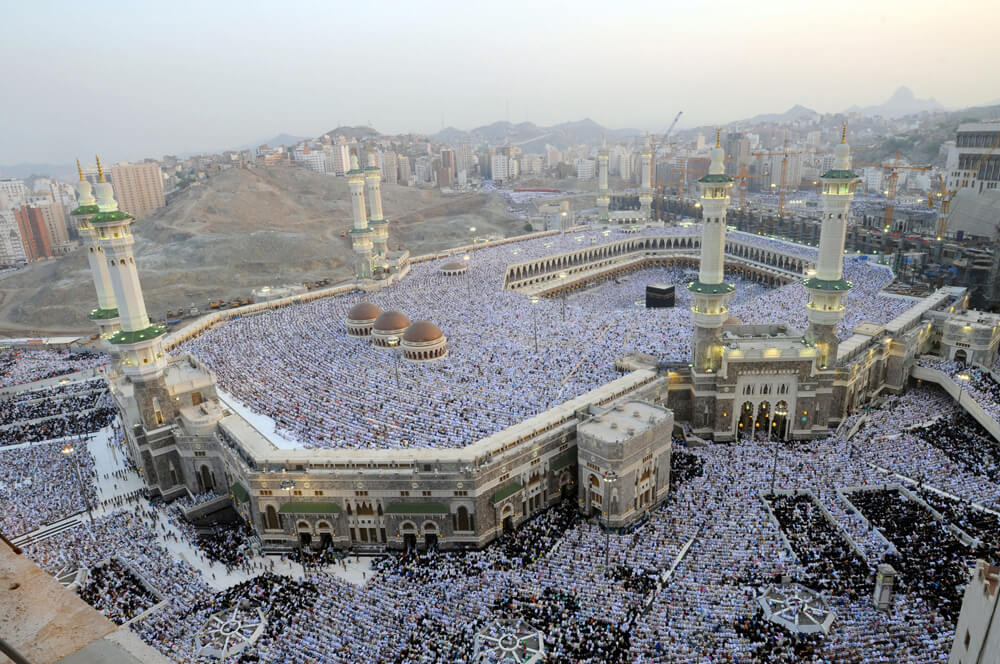Wednesday, August 23rd, 2017 will be the first day of the month of Dhu al-Hijjah,…
The Excellence of Hajj
 As the sacred month of Dhu al-Hijjah begins, millions of Muslims throughout the world are commencing their pilgrimage to Mecca. Individually, each person who embarks on this journey has their own spiritual objective in mind. Collectively, however, this global convergence is for a common purpose, to perform the rituals of Hajj. And why is Hajj so important? At the forefront, it is a religious obligation. All (eligible) Muslims are expected to complete the Hajj at least once during their lifetime, as ordained in the Holy Qur’an, “Those who have the means and ability have a duty to God to visit the House and perform the Hajj (pilgrimage) rituals.” (3:97) But what do the faithful hope to achieve besides fulfilling a religious obligation? Why do so many labor so intensely to perform the Hajj again and again, especially after having completed the required one? The answers to these questions can be found when contemplating the excellence of Hajj as seen from narrations of the Holy Prophet (pbuh) and his holy progeny (p).
As the sacred month of Dhu al-Hijjah begins, millions of Muslims throughout the world are commencing their pilgrimage to Mecca. Individually, each person who embarks on this journey has their own spiritual objective in mind. Collectively, however, this global convergence is for a common purpose, to perform the rituals of Hajj. And why is Hajj so important? At the forefront, it is a religious obligation. All (eligible) Muslims are expected to complete the Hajj at least once during their lifetime, as ordained in the Holy Qur’an, “Those who have the means and ability have a duty to God to visit the House and perform the Hajj (pilgrimage) rituals.” (3:97) But what do the faithful hope to achieve besides fulfilling a religious obligation? Why do so many labor so intensely to perform the Hajj again and again, especially after having completed the required one? The answers to these questions can be found when contemplating the excellence of Hajj as seen from narrations of the Holy Prophet (pbuh) and his holy progeny (p).
Sins are forgiven
Among the foremost reasons for performing Hajj for many pilgrims is the promise of attaining forgiveness form the Almighty. But why not pray for forgiveness from home? It’s certainly easier than traveling halfway across the world, particularly for those in the western hemisphere. According to many narrations on this topic from the Holy Prophet (pbuh) and his pure family, we see that there is a special kind of forgiveness that is granted for those who undergo this difficult, yet spiritually rewarding pilgrimage.
In one example, Imam Ja’far al-Sadiq (p) has said, “My father would say, ‘One who decides to perform Hajj or Umrah (the lesser, optional pilgrimage) free of [arrogance], returns, in matters of sins, as the day his mother gave birth to him.’” (Al-Kafi, Vol. 4, p 224) Essentially, the faithful are divinely promised a “clean-slate” of spirituality as one of the rewards for performing Hajj. The appeal is almost immediately clear. Consider the mental state of a believer who is perhaps depressed and concerned about his or her spiritual well-being. To learn of a path that provides an almost instantaneous cleansing of the soul by completing the rites of Hajj can, at the very least, provide much needed hope for salvation and relief from despair.
“Paradise becomes necessary”
This thought is exemplified further in another narration from Imam Zayn al-Abidin (p) where the fourth Imam (p) says “One who performs Hajj is forgiven [and] paradise is necessary…” (Al-Kafi, Vol. 4, p 224) Here, not only are the faithful promised forgiveness, but they are assured that paradise becomes “necessary” for those who undertake this pilgrimage. One should note however, that this does not translate into a guarantee without conditions. In a third narration, the sixth Imam (p) has said that “A pilgrim continues to live with the light of the Hajj until he commits sins again.” (Al-Kafi, Vol. 4, p 226) A person can achieve forgiveness and return home cleansed of sins, but this lasts only if new sins are not committed. In other words, performing Hajj does not give one a pass for future transgressions.
It should be performed often
To this point, one may find it difficult to protect themselves from going astray after having sought repentance.. Yes, there are certain religious obligations that are hard to abide by and it’s not always easy to stay the course when it comes to piety. But difficulty in abstaining from sins is not a justification for committing them. Fortunately, God does not close the door to forgiveness. It is narrated that the Holy Prophet (pbuh) said: “Perform the Hajj and the Umrah consecutively; they remove poverty and sins just as [a bellowing furnace] removes impurities from iron.” (Al-Kafi, Vol. 4, p 226) The faithful are encouraged to perform the rituals of Hajj and the optional pilgrimage often. God recognizes that His creatures are weak. He has said as much in the Holy Qur’an: “All human beings were created weak.” (4:28) To this, He has provided a powerful means for the faithful to refresh their spirits whenever they wish. Even though Hajj is performed at a prescribed time during the month of Dhu al-Hijjah, the optional pilgrimage (Umrah) can be performed at any time during the year.
Related Posts
- The Crescent Moon of the Month of Dhu al-Hijjah, 1438 A.H.
- The Horizon in the School of al-Sayyid al-Sistani
A group of believers in North America would like to inquire about that which was…
- Zakat al-Fitrah - 2016
In the name of Allah, the Beneficent, the Merciful Zakat al-Fitrah ((زكاة الفطرة Click Here…

Leave a Comment:
You must be logged in to post a comment.